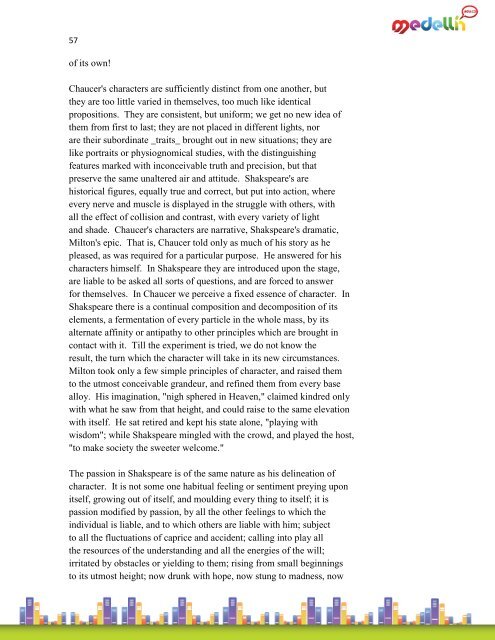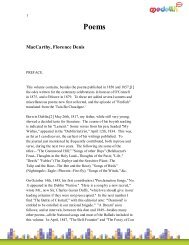Lectures On The English Poets William Hazlitt
Lectures On The English Poets William Hazlitt
Lectures On The English Poets William Hazlitt
You also want an ePaper? Increase the reach of your titles
YUMPU automatically turns print PDFs into web optimized ePapers that Google loves.
57<br />
of its own!<br />
Chaucer's characters are sufficiently distinct from one another, but<br />
they are too little varied in themselves, too much like identical<br />
propositions. <strong>The</strong>y are consistent, but uniform; we get no new idea of<br />
them from first to last; they are not placed in different lights, nor<br />
are their subordinate _traits_ brought out in new situations; they are<br />
like portraits or physiognomical studies, with the distinguishing<br />
features marked with inconceivable truth and precision, but that<br />
preserve the same unaltered air and attitude. Shakspeare's are<br />
historical figures, equally true and correct, but put into action, where<br />
every nerve and muscle is displayed in the struggle with others, with<br />
all the effect of collision and contrast, with every variety of light<br />
and shade. Chaucer's characters are narrative, Shakspeare's dramatic,<br />
Milton's epic. That is, Chaucer told only as much of his story as he<br />
pleased, as was required for a particular purpose. He answered for his<br />
characters himself. In Shakspeare they are introduced upon the stage,<br />
are liable to be asked all sorts of questions, and are forced to answer<br />
for themselves. In Chaucer we perceive a fixed essence of character. In<br />
Shakspeare there is a continual composition and decomposition of its<br />
elements, a fermentation of every particle in the whole mass, by its<br />
alternate affinity or antipathy to other principles which are brought in<br />
contact with it. Till the experiment is tried, we do not know the<br />
result, the turn which the character will take in its new circumstances.<br />
Milton took only a few simple principles of character, and raised them<br />
to the utmost conceivable grandeur, and refined them from every base<br />
alloy. His imagination, "nigh sphered in Heaven," claimed kindred only<br />
with what he saw from that height, and could raise to the same elevation<br />
with itself. He sat retired and kept his state alone, "playing with<br />
wisdom"; while Shakspeare mingled with the crowd, and played the host,<br />
"to make society the sweeter welcome."<br />
<strong>The</strong> passion in Shakspeare is of the same nature as his delineation of<br />
character. It is not some one habitual feeling or sentiment preying upon<br />
itself, growing out of itself, and moulding every thing to itself; it is<br />
passion modified by passion, by all the other feelings to which the<br />
individual is liable, and to which others are liable with him; subject<br />
to all the fluctuations of caprice and accident; calling into play all<br />
the resources of the understanding and all the energies of the will;<br />
irritated by obstacles or yielding to them; rising from small beginnings<br />
to its utmost height; now drunk with hope, now stung to madness, now

















